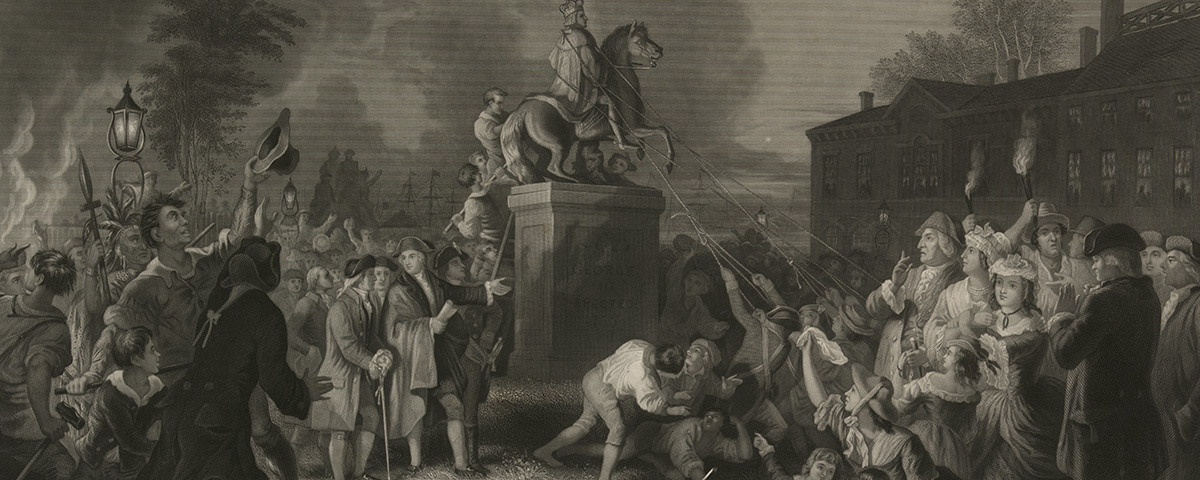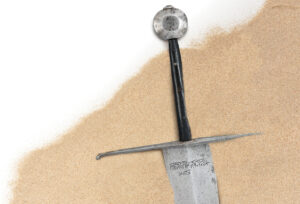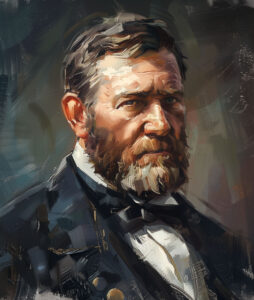THE ENGLAND FROM which America revolted in 1775 was a cat’s cradle of dynasties, royal and aristocratic. The king, George III, was a scion of the House of Hanover. His prime minister, Lord North, was an earl. William and Richard Howe, the general and the admiral the king sent to defeat his rebellious subjects, were his cousins (their grandmother had been a mistress of George I). The House of Lords was composed of men who held hereditary titles, while the House of Commons, Parliament’s elected branch, was also stuffed with aristocrats. The most famous exception in English political life was the pro-American Member of Parliament William Pitt, known as the Great Commoner—until he accepted the title of Lord Chatham.
The United States determined to free itself from all this. The first self-evident truth of the Declaration of Independence is that all men are created equal: There would be no social ranks here. Both the Articles of Confederation and the Constitution forbade titles of nobility—a prohibition that Alexander Hamilton, son of a shopkeeper, hailed in the Federalist as “the cornerstone of republican government.” So long as titles were “excluded” from American life, Hamilton argued, “there can never be serious danger that the government will be any other than that of the people.” Who would subvert popular rule if everyone were on the same footing? Benjamin Franklin, son of a candle maker, gave the egalitarian principle a folksy spin, writing that titles actually harmed those who held them, making them “proud, disdainful of the useful arts, and thence falling into…servility and wretchedness.” Pity the poor noblemen—they could never be as industrious and productive as artisans or tradesmen.
The new country did not propose to be an anarchic mass, however. The Continental Army was commanded by ranks of officers, and state and federal governments were composed of legislators, judges, executives and their subordinates, from cabinet secretaries to clerks. But all these officeholders were elected or were appointed by other officeholders who had been elected.
Who would hold office in such a system? In 1813 an elderly Thomas Jefferson (son of a wealthy planter, but a man of impeccable liberal sentiments) addressed this question in a letter to his old friend John Adams (son of a farmer).
In all societies, Jefferson admitted, there was an “artificial aristocracy, founded on wealth and birth.” Its members rose to the top because they bought their way there or because they were born there. Jefferson believed that such “artificial” aristocrats looked out only for themselves; he called them “a mischievous ingredient in government.” But there was also a “natural aristocracy among men. The grounds of this are virtue and talents.” Natural aristocrats rose to prominence because of their superior morality and ability; they would conduct the public business with selflessness and skill. Their existence was virtually guaranteed by the nature of things. “It would have been inconsistent in creation,” Jefferson explained, “to have formed men for the social state, and not to have provided virtue and wisdom enough to manage the concerns of society.”
What about ordinary people? They were the majority in any society, and Jefferson believed that, if given a choice, they would prefer to be governed by natural aristocrats. “Leave to the citizens the free election and separation of the aristoi from the pseudo-aristoi, of the wheat from the chaff. In general they will elect the real good and wise. In some instances,” he conceded, “wealth may corrupt and birth blind them”—the people might occasionally pick an artificial aristocrat or two—“but not in sufficient degree to endanger the society.”
It was an optimistic vision of democracy as a meritocracy. Jefferson wrote with his habitual confidence and with the complacency of a proven winner. America’s citizens, it is true, had narrowly failed to make him president in 1796. But then they had elected him in 1800 and triumphantly re-elected him four years later. Everything was for the best in this most American of all worlds.
But there were dynastic undercurrents even in the republican utopia. The United States granted no titles, but Americans were tickled by the presence in their Revolutionary ranks of European noblemen like Baron von Steuben and the Marquis de Lafayette. One all-American officer in the Continental Army bore a foreign title, or said he did. William Alexander (born in New York City, settled in New Jersey) claimed a defunct Scottish earldom, and was addressed by his comrades throughout the war as “Lord Stirling.” Jefferson himself was pleased when, in 1803, Betsy Patterson, the lovely daughter of an Irish immigrant who had made his fortune in Baltimore, married Napoleon’s youngest brother, Jerome Bonaparte. Napoleon was not pleased—he wanted European nobility for in-laws, not Yankee commoners—and annulled the match.
There were rumors throughout the founding period that this pleasure in foreign titles was actually something more sinister. The Scottish writer Sir Walter Scott claimed that the United States had approached Charles Edward Stuart, the Jacobite pretender to the English throne, to offer him a crown. Critics of the Constitutional Convention feared that that conclave—which deliberated in secret—might make a similar offer to some other Old World royal. The Convention did no such thing, but Hamilton, who participated as a delegate from New York, did give a long speech in which he called for a national executive elected for good behavior—for life, if he behaved well. His suggestion, he admitted, went “beyond the ideas of most members.”
The man around whom these tensions swirled was George Washington. Washington was, in effect, America’s chief executive twice—commander in chief for almost the entire Revolution (1775-83), then first president for two terms (1789-97): more than 16 years at the top. He looked the part; Benjamin Rush, a signer of the Declaration of Independence, gushed that any European monarch would look like a “valet de chambre” by his side. Washington had the same first name as George III, and their long-nosed faces were similar enough that numismatists have trouble saying whether Revolutionary-era tokens with the inscription GEORGIUS TRIUMPHO were meant to hail the king or the rebel.
Some Americans had trouble making the distinction between an elected leader and a royal one. In May 1782, after Washington’s great victory at Yorktown but before the treaty of peace had been signed, one of his officers, Col. Lewis Nicola, wrote the commander in chief a provocative letter claiming, “This war must have shown to all, but especially to military men in particular, the weakness of republics.” Washington knew the weaknesses well: indecision, backbiting, poor planning. Nicola asked, Shouldn’t Washington become a king? After he became president instead in April 1789, the Senate wanted him to have an almost royal honorific: “His Highness the President of the United States of America and Protector of the Rights of the Same.”
Washington rejected both the substance and the forms of monarchy. He had not endured the cold of Morristown and the heat of Monmouth simply to switch one crown for another. He sent Colonel Nicola a reply that was as blunt as a bat: “If you have any regard for your country, concern for yourself or posterity, or respect for me…banish these thoughts from your mind.” He let a loyal friend in the First Congress, Rep. James Madison, trim the Senate’s booming verbiage to “The President of the United States.” Anything more, Madison argued, “would disgrace the manly shoulders of our chief.”
Washington had a personal reason, beyond his own convictions, for knowing that he could never be king: He was childless. His wife, the former Martha Custis, had had four children by her first marriage (all dead by 1781); even though she married George in her late 20s, she had had no more. In a draft of his first inaugural address, Washington cited his infertility as a guarantee of his republicanism. “I have no child for whom I could wish to make a provision—no family to build in greatness upon my country’s ruins.” Madison, who ghosted the address that Washington ultimately gave, cut that statement out. But Washington’s point was important. All of the founding presidents were anti-monarchists, and none of them would have tolerated a son winning office by any means other than election. For three of them, as for Washington, the issue never arose. Jefferson, Madison, and James Monroe, the third, fourth and fifth presidents, were childless or had daughters. American politics might have been congested indeed if there had been a second generation, a junior varsity squad, of Washingtons, Jeffersons, Madisons and Monroes.
Politics did in fact get congested at the state level, where family dynasties proliferated. The last colonial governor of Connecticut, Jonathan Trumbull, was also the first post-independence governor. A patriot and an important ally of Washington, he served from 1769 to 1784. One son, Jonathan Trumbull Jr., served as governor from 1798 to 1809. Another son, John Trumbull, was the premier artist of the Revolution; his painting The Signing of the Declaration of Independence is copied on the back of the two-dollar bill.
Jefferson, in his correspondence with Adams, mentioned Connecticut’s “traditionary reverence” for favorite families, which he attributed to the state’s reactionary politics. (He considered Connecticut reactionary because it never voted for him in any of his presidential races.) “In Virginia,” he added piously, “we have nothing of this.” Nonsense. Virginia swarmed with powerful families. The Lees produced two signers of the Declaration (Richard Henry and Francis Lightfoot), two diplomats (Arthur and William) and a cavalry officer (Henry, better known as Light-Horse Harry). Henry’s son Robert would win fame in a later war.
Some dynastic families were so large that they fought among themselves. America’s first two-party system split the Pinckneys of South Carolina. Brothers Thomas and Charles Cotesworth (a signer of the Constitution) were both staunch Federalists. But they had a cousin, another signer of the Constitution, Charles—nicknamed Blackguard Charlie—who in the election of 1800 worked successfully to put South Carolina in the Republican column. The Randolphs of Virginia were related to both Thomas Jefferson and John Marshall: Jefferson’s mother and Marshall’s grandmother were Randolphs. As chief justice, Marshall twice administered the presidential oath of office to his cousin. But the two men loathed each other: Jefferson thought the chief justice was a sophistical Federalist, Marshall thought the president was a Republican demagogue.
John Adams was not surprised by the ongoing power and political success of prominent families. In his letters to Jefferson, he admitted New England’s fondness for “aristocratical families.” He recalled a conversation, decades earlier, with an old judge who had asked him to read the election returns from neighboring Rhode Island. “I read the list of Wantons, Watsons, Greens, Whipples, Malbones, etc.” The judge said, “I expected as much….Elections will generally go in favor of the most ancient families.”
Adams thought it wasn’t just a New England trait. There are “five pillars of aristocracy,” he lectured Jefferson: “beauty, wealth, birth, genius and virtues.” Any one of these qualities gave a man, or a woman, influence, and thus power, even in a democracy. Then power, once acquired, would accrue to the aristocrat’s relatives.
“Call this principle, prejudice, folly, ignorance, baseness, slavery, stupidity, adulation, superstition or what you will,” Adams concluded. “But the fact…I cannot deny or dispute or question.”
Jefferson believed that democracy advantaged the good. Adams thought it was equally likely to boost the good looking, the rich and the well-born. His more cynical view may have been encouraged by his own experience at the polls. He had run for president twice: the first time (1796) successfully, the second (1800) going down to defeat—against Thomas Jefferson. Jefferson had lost, then won. Adams had won, then lost. No wonder Jefferson’s opinion of democracy was sunnier.
But Adams had a consolation. He had none of the advantages of beauty, wealth, or birth, but genius and virtues had taken him far. And he, alone of the founder presidents, had sons. Genius, virtues and his own success would help his eldest son, John Quincy Adams, become a diplomat, senator, secretary of state and finally sixth president of the United States.
Richard Brookhiser is a historian and biographer, senior editor for National Review, columnist for American History and author of Founding Father: Rediscovering George Washington; James Madison, Gentleman Revolutionary and What Would the Founders Do?
Originally published in the April 2016 issue of American History magazine. Subscribe here.





